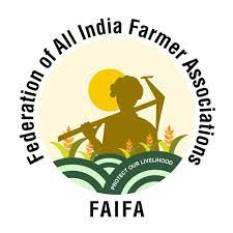NEW DELHI, 4 June 2023: Farmer associations across India have questioned a recent recommendation by the World Health Organization (WHO) to substitute tobacco with alternative crops.
The WHO's recommendation was made in its 2023 report on global tobacco control, which was released on May 24. The report states that tobacco production is a major contributor to climate change and that alternative crops should be used to replace tobacco crops.
However, farmer associations argue that the WHO's recommendation is unsubstantiated and that it would have a devastating impact on the livelihoods of millions of farmers in India.
"The WHO's recommendation is based on a Western model of tobacco consumption," said Javare Gowda, president of the Federation of All India Farmer Associations (FAIFA). "It does not take into account the agro-climatic conditions in India, where tobacco is a major crop."
Gowda said that tobacco is a valuable crop for farmers in India. It is a relatively drought-resistant crop that can be grown in a variety of soil types. Tobacco is also a high-value crop, which means that it can generate a good income for farmers.
"If we are forced to substitute tobacco with other crops, it will have a devastating impact on the livelihoods of millions of farmers," said Gowda. "Many farmers will be forced to leave agriculture altogether, which will lead to increased poverty and hunger."
Gowda called on the government to reject the WHO's recommendation and to support the continued cultivation of tobacco in India.
"Tobacco is a valuable crop for farmers in India," said Gowda. "The government should support the continued cultivation of tobacco and should not be influenced by the unsubstantiated recommendations of the WHO."
The WHO's recommendation has also been criticized by the Tobacco Board of India.
"The WHO's recommendation is a knee-jerk reaction to the problem of climate change," said a spokesperson for the Tobacco Board. "It is not based on any scientific evidence and it would have a devastating impact on the livelihoods of millions of farmers."
The spokesperson said that the Tobacco Board is working with the government to develop a plan to mitigate the impact of climate change on tobacco production.
"We are confident that we can develop a plan that will protect the livelihoods of farmers while also reducing the impact of tobacco production on the environment," said the spokesperson.
The WHO's recommendation is likely to be a major source of debate in the coming months. It is a complex issue with no easy answers. However, it is clear that the livelihood of millions of farmers in India is at stake.




















